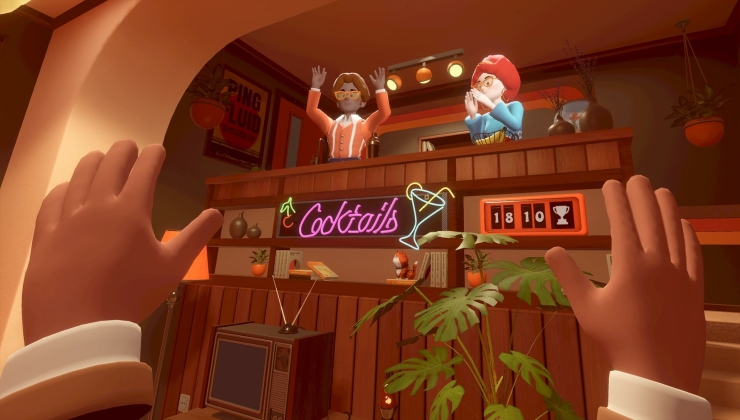At my studio we maintain a native Linux version with a custom game engine, and it indeed takes a lot of time. I don’t consider Proton a viable option as we lost the ability to integrate with Linux-specific stuff such as Wayland APIs or better input, but I can definitely see the appeal of switching to Proton… if your team uses Windows. If you have some developers on Linux, you naturally get a Linux build (if using cross platform APIs ofc) and it’s actually faster to cross-compile a Windows build every once in a while (skip the slow ntfs I/O) and ship that. But it requires getting more of the team on Linux :)
But it requires getting more of the team on Linux :)
Get them a Steam Deck and target only Steam Linux Runtime 3.
Ah, yes… if only. I’ve upgraded internally SLR 1.0 -> SLR 3.0 but we can’t deploy it until a bug is fixed in the Steam client that causes, when we enable SLR 3, all Steam Decks to run the Linux build. Yes, Steam Decks run the Proton version, solely because the save file has different letter casing (yes I know it’s so annoying haha). We’ve spent quite some time on this and there’s no way to fix this without some folks losing their saves, and that is absolutely not an option. Soooo for now desktop Linux is stuck on runtime 1.0, and Steam Deck users are stuck on Proton. “fun” :/
we can’t deploy it until a bug is fixed in the Steam client that causes, when we enable SLR 3, all Steam Decks to run the Linux build. Yes, Steam Decks run the Proton version, solely because the save file has different letter casing
Sounds more like the bug is on your side caused by whoever had the genius idea to use different file names for Windows and Linux builds.
there’s no way to fix this without some folks losing their saves, and that is absolutely not an option.
For me the fix looks very easy: Use completely new file names. The old saves are only read and new saves get the new file names. Stay on the current SLR/Proton setup until the saves are migrated to the new naming format for the active user base. Make a dedicated “beta” branch for legacy saves in a year or so to not screw over inactive users. Make announcements and pinned forum posts.
Steam Deck uses ext4 with casefolding so upper / lowercase in filenames don’t matter. Is casefolding getting in your way?
Fair. I’ll take a working Windows build with proton over a janky Linux port any day of the week
In a decade, most games will be cross platform but compiled for
windowsproton and people will have forgotten why. Then somebody or some group will come up with “cross platform compilation” and the circle will start a new only to return to proton or some form of it.As much as I would love Linux native builds of games, this also makes a lot of sense. I consider it a completely acceptable solution to the problem.
As a cross platform developer I consider this incompetence.
That’s not necessary a bad thing. The world is full of less experienced programmers. But they’re making it look like it’s a hassle to release for Linux when in reality you can foresee and plan for this from the start, without much overhead down the line.
Why do people attribute decisions like that to the competence of the programmers? This is a business decision, nothing else. Most likely, some MBA looked over the numbers, saw a few hundreds or thousands of hours logged for tasks related to supporting Linux, and decided that Proton was good enough. Most likely, no programmer was even asked whether Linux support should be dropped.
And yes, even if you know what you are doing, every build going out to tens of thousands of active players needs to be tested, and that costs time and thus money, which is something every experienced cross platform developer should know.
Why do people attribute decisions like that to the competence of the programmers?
Because supporting multiple platforms, especially in gaming, isn’t magic or rocket science and almost always comes down to the setup of the toolchain.
This is a business decision
Very possible. But I go by their actual statement: “maintaining the native build across many distros was taking time away from developing new content”. My point is regarding the “maintaining […] across many distros” and not the “taking time away”. A good toolchain would make these differences extremely minimal.
hundreds or thousands of hours logged for tasks related to supporting Linux
Extremely unlikely. That would mean more than 10 developers working fulltime purely on Linux support since the release of the game. According to their team page on their website they have 7 developers in total.
every build going out to tens of thousands of active players needs to be tested
This is why experienced developers decouple the game from the platform specific stuff and test them separately.
The game is made in Unity so most of the platform specific stuff should already be production ready. Unity literally markets their engine as “Industry-leading multiplatform support” with the motto “Create once, ship anywhere”.
So my argument still stands. And as I said, it’s not a bad thing. The only thing I dislike is the indirect implication of Linux being a hassle when it would be nicer if they would take more responsibility for it.
The game has been released 4 years ago. An average worker in the US works 1770 hours a year.
10 developers working full time over 4 years (and this doesn’t even include the time they spent building the initial release) would work a total of ~70 000 hours, not “hundreds or thousands” of hours.
In fact, even thousands of hours would be only a single man year.
They’ve released 23 content updates so far, bugfix patches are probably much more. Even just building, superficially testing and deploying a release easily takes 4-5h. And this game is not just a plain and simple flat screen game, but one that supports SteamVR, something that’s not remotely trivial on Linux.
Even a single non-trivial bug can cost 20h of total work time from support handling the report, a dev reproducing it, the bug going trough refinement, bugfixing, code review, testing, deployment and so on.
I guess you haven’t worked in a real company before and don’t know how project management and processes work. Stuff takes a lot of time.
And believing that Unity just magically abstracts all OS-specific bugs away is very naive.
And it’s ridiculous to claim that they are dropping Linux support after 4(!) years because they are too incompetent to figure out how to support Linux. Obviously they could support Linux just fine from a technological standpoint.
comes down to the setup of the toolchain.
Unless you’re developing graphics-heavy application that uses platrofm-specific API for optimisation. Like a video game for example.
Removed by mod
Not a game, but I was involved in making a graphics heavy app. Significant amount of times we had to grapple with question " that’s a nice feature you are making, will this work on all the platforms", and significant amount of times the answer was “obviously, unquestionably no”.
Removed by mod
And you should get some experience developing something more complicated than a simple unity project.
But they’re making it look like it’s a hassle to release for Linux when in reality you can foresee and plan for this from the start, without much overhead down the line.
They have the overhead to support macOS, though:

Linux has proton, Mac OS doesn’t.
If they give half a shit about it then supporting the gam through proton is a lot less effort than making an actually good native linux version.
Linux has proton, Mac OS doesn’t.
macOS has Apple Game Porting Toolkit which is just another Wine distribution for which developers made easy installers for. GPT + Windows version of Steam is how I played Counter Strike 2 against a Mac user just recently.
https://developer.apple.com/games/game-porting-toolkit/
That said, I didn’t really expect someone with that Lemmy handle to know such things.
I’ve been messing with that tool on and off from the day it was available to developers. I’m well aware of it. It’s ass.
It’s been a few months since I’ve used it so maybe it’s gotten better? But this is Apple and gaming, so I don’t have high hopes.
It’s not at all comparable to proton other than it does the bare minimum to make a game work. All of the tools and tweaks that go into proton are what make it so good. Maybe for CS2 someones put in the work to make it ok. But whether it’s through crossover, wiskey, or whatever else it’s been awful for me. Maybe version 2 is better. But even then I doubt it will be as seamless or good as proton is.
Removed by mod
Linux is pretty easy too release something for, the real fucking pain is MacOS
Every month xcode updates and breaks everything. Every two years I have to cycle a million certs that have different names depending on what apple docs your are looking at. Apple is pain
Apple can stuff eucalyptus tress up their asses.
Removed by mod
Please don’t do this
It makes perfect sense to do this. You have no idea how much extra work it is to maintain a Linux-native version that works predictably across the entire range of Linux machine configurations. Factorio has one guy, raiguard (hallowed be his name), in charge of the Linux build, and he wrote a blog post about the unique challenges of supporting the Linux native build.
Proton is already known to be perfectly capable of running most games as good as or even better than Windows. Game developers can defer the issue of compatibility and focus on developing the game instead of having to implement client-side decorations for GNOME users.
I’m a software developer that releases for Linux. I know it’s a pain. I’m just in the camp of thinking we should fix it instead of giving up.
You have no idea how much extra work it is to maintain a Linux-native version that works predictably across the entire range of Linux machine configurations.
Because in this day and age targeting a billion different configurations is stupid. Steam Linux Runtime exists to remedy exactly that.
Proton is already known to be perfectly capable of running most games as good as or even better than Windows.
And then an update comes along and breaks compatibility. News stories about this are frequent.
instead of having to implement client-side decorations for GNOME users.
-
Games usually run full screen.
-
SteamOS doesn’t use Gnome.
-
Native Linux games targeting only Steam Deck’s setup are still a better experience than Windows games under Proton aren’t integrated with Gnome either because Valve doesn’t care about Gnome.
And then an update comes along and breaks compatibility. News stories about this are frequent.
A proton update? Just use the last version.
If you mean game update, this dev is targeting proton. As in their “linux support” will take the form of making sure they don’t break anything on their end.
A proton update? Just use the last version.
I meant mostly game updates because developers get lulled into the belief that “Proton just works, don’t need to test anything”. Wine and Proton developers are not a huge team either. There is no guarantee that Proton will always work. That’s even spelled out in the license. There were rare occurrences of a Proton update breaking a game. Granted, they are very rare but I had to switch to an older Proton release for a game once.
As in their “linux support” will take the form of making sure they don’t break anything on their end.
Their previous Linux support consisted of “maintaining the native build across many distros” instead of targeting only Steam Linux Runtime. Of course targeting a big number of Linux distributions is more work. Valve didn’t release SLR for the lulz. It’s a stable environment, based on Debian Stable.
Your dogwater arguments boil down to “it should support this specific configuration and fuck everyone else”. How is that different from a game being restricted to Windows? And how exactly does that solve the issue of still dedicating significant effort to support an even smaller set of devices?
(edit) Actually, don’t answer that. Your comment is proof of your remarkable ignorance on the topic and anything else you have to say is a waste of everyone’s time.
Your dogwater arguments boil down to “it should support this specific configuration and fuck everyone else”.
No, because Steam ships Steam Linux Runtime in all configurations. Everybody with some insight in that topic knows that.
How is that different from a game being restricted to Windows?
Windows is an entirely different operating system, duh. Game updates break Proton all the time, take longer to load, on installation they execute super slow installation scripts, etc. If your so knowledgeable as you claim with your condescending tone, you’d know that.
And how exactly does that solve the issue of still dedicating significant effort to support an even smaller set of devices?
Steam Deck is the market leader in PC handhelds and 3rd parties like Lenovo adopt SteamOS.
Actually, don’t answer that.
I opt to ignore that order you’re in no position to give.
Your comment is proof of your remarkable ignorance on the topic
You confirm that you have absolutely no clue about Steam Linux Runtime and how that is a more stable than an ever changing cat and mouse game of Windows updates, Proton updates, and game updates.
and anything else you have to say is a waste of everyone’s time.
Nobody forced you to reply to me. Next time, I suggest you read up on Steam Linux Runtime and Windows games braking Proton with updates.
-
Do you remember the days before proton? Like the time I couldn’t play Terraria for months because they didn’t have anyone in their dev team who could update the Linux version to keep it working. The workaround was to get the windows version working through wine.
Using wine to play windows games is something we have done for years before proton made it easier. It’s a very Linux thing to do. Even some old ports were just using wine wrappers.
Do you remember the days before proton?
The days before Proton are the days before Steam Linux Runtime because Proton runs on top of Steam Linux Runtime. It doesn’t run on top of the host Linux libraries.
The problem with Linux ports isn’t Linux, it’s sloppy ports. The 1.0 Scout runtime wasn’t properly containerized back in the day, so games could call host libraries. That changed with 2.0 Soldier (using Bubblewrap, the same tech used by Flatpak) but Valve made it hard to target 2.0 because game developers had to request its use from Valve. That changed with 3.0 Sniper last year.
Only the Escape Simulator developers know why they didn’t switch over from “maintaining many distributions” to requesting SteamRT 2.0 Soldier years ago.
Do you like the half-maintained and rarely updated Linux builds more? I sure don’t.
Why?
Removed by mod
On the one hand, it’s a shame in general, as Proton has truly been a pesky thorn on the foot for Linux gaming. There’s a world of difference between having native, first-class support, and basically running every game on an emulator that is on a lease.
It’s not an emulator it’s an abstraction layer for the DirectX API etc. They’re similar in ways but not quite the same.
As for the difference in native support, well actually having such a later might mean longer support. Some older native games may not run well on future systems as libraries and the kernel change, whereas so long as proton runs, the older games should continue to work.
Proton also adds functionality that wasn’t really in the native Windows, i.e. superior suspend and certain input mapping features.
Yeah, it’s annoying to not have it native, but having Proton also means there’s just one thing to maintain support for. If a major system library changes you patch Proton, not a thousand different games and programs.
Until Linux gaming starts making use of some form of standardized containers or maintain proper LTS environments there will always be a need to keep each game updated individually to maintain compatibility when old libraries gets deprecated. About time somebody gets that going (and no I definitely do not just mean flatpack)
Edit: apparently there’s a Steam Linux runtime based on containers, maybe if we can get that standardized it would help
Yes, its such a thorn being able to finally drop windows and play all my games on linux.
God won’t someone save us from this terrible miscarriage of justice. If we cant have perfection, then we don’t deserve anything at all!
you’re missing the point. the linux gaming market is increasing, but proton is in some ways a crutch keeping proper linux support from games because its much easier to support just one platform rather than two.
yes yes, if its not the perfect solution, then we should have no solution. its a tired old argument.
You keep hallucinating this, as if you were an AI…
Realized you got talked into a corner, and rather than admit wrong you are gonna reply to every post with insults and insinuations?
i don’t think anyone in this thread is saying we shouldn’t have proton, but just that it is holding back actual linux development. I for one love my steamdeck and use proton all the time.
but facts are facts, and there are less games being developed for linux because of proton.
I have several native Linux games but I use the Windows version on proton because it’s more reliable. The games used to work great but not so much anymore.
Yeah, outside of Stardew Valley and minecraft, my experience with linux native games has been… unpleasant. Meanwhile, the proton version of the same games have never given me issue.
i don’t think anyone in this thread is saying we shouldn’t have proton,
Really?
On the one hand, it’s a shame in general, as Proton has truly been a pesky thorn on the foot for Linux gaming
Cause that implies wanting to get rid of it. You don’t tend to fondly keep as a momento the thorn in your foot… you rip it out and get rid of it.
deleted by creator
You are the one choosing to read it that way and then hallucinating a whole sort of “perfection or nothing” argument from that.
Feels like you have some bone to chew, and I’m not exactly sure what kind of bone.
Sure buddy.
deleted by creator
Nope. They just don’t know what they’re talking about, something unfortunately common when talking about Proton.
“Drops the Linux build to focus supporting proton” makes as much sense as “drops the windows build to focus supporting direct x in wine”
“Drops the Linux build to focus supporting proton” makes as much sense as “drops the windows build to focus supporting direct x in wine”
They could target WSL for Windows compatibility.
I don’t own this game, but twice I have switched positive reviews to negative for doing this.
Then your an absolute moron. This should be praised, they could have said fuck linux entirely but instead they said “hey native is costing us too much time, so instead we will just work on making sure our windows code is proton compatible”
That should be the goal, tired of worthless native purist assholes pushing developers away from Linux entirely by being little bitches about it. Game working is game working if proton is the easier path for the developer then cheer them on.
Why? Proton works really well nowadays. As long as it runs, who cares if it’s native Linux?












